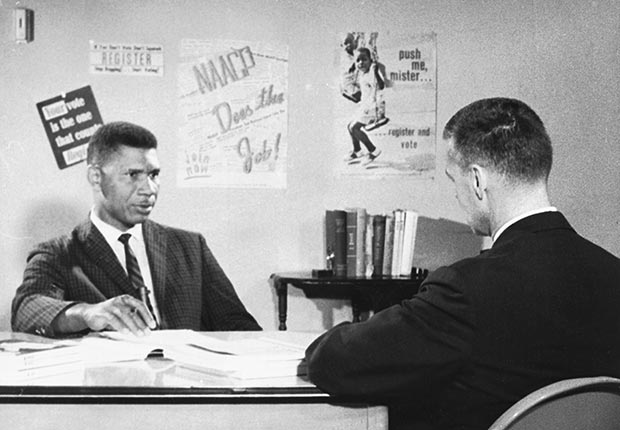The problem of voter apathy: A historical perspective

Medgar Evers, left, was a Civil Rights activist who worked to ensure voting equality. Photo credit to aarp.com
By Annika Jensen, Editor-in-Chief
In June of 1963 Medgar Evers, a prominent Civil Rights activist in Mississippi, was assassinated, shot in his driveway by white supremacist Byron De La Beckwith. Evers was passionate about ensuring voting rights for African Americans, particularly eliminating violence and intimidation at the polls. After the assassination, Evers’ wife Myrlie took a prominent role in continuing her late husband’s democratic dream, and in 2013 Medgar was immortalized by Frank X Walker in the book Turn Me Loose, a collection of perspective poems about Evers’ legacy and the struggle for the African American vote.
I read this book for English 250: Literature of the Civil Rights Movement during my first semester at Gettysburg. The reading was assigned in late October, just several weeks before the 2014 midterm elections. When my professor asked our class how many of us were registered to vote, or how many of us had already submitted absentee ballots for our home states, a few hands sprinkled up and a few heads nodded, but there was no overwhelming majority.
In that moment, my professor expressed the same outrage at this sense of apathy, this taking for granted of our greatest democratic power, as I do today. He told us that Evers did not risk–and eventually give–his life in the name of voting rights just to have us conclude that we did not desire the responsibility of decision making, and I agree. He said that Evers was never meant to be a martyr, but he’d be rolling in his grave if he knew that we were ignoring the privilege we have been given in the vote, and I agree.
In choosing apathy in the upcoming general election, you are shattering Evers’ legacy and dismantling his dream.
Don’t like either frontrunning candidate? Tough luck; chances are, you like one better than the other. Vote for that one. Whatever statement you intend to make in withholding your vote is no more than a lesson in ignorance and selfishness. Don’t feel that you can morally vote for either frontrunning candidate? Vote Johnson, or do a write in.
Let it be known: choosing not to vote because you don’t like either frontrunning candidate is not a noble or heroic venture, it is a disgraceful one. It is a get-out-of-jail-free card that subsequently incarcerates the rest of the nation. It is disrespectful to your party, your country, your community; to Medgar Evers and every Civil Rights activist who has fought for the democratic core which you take so blatantly for granted.
At the end of July my father, who moved to the United States in 1990, will be sitting for his naturalization interview after months of preparation and studying, sheaves of paperwork, and a little more pocket change than seems reasonable. If he is naturalized, it is his hope to vote in November’s general election. After 26 years in this country, he has decided that the time has come when the right to speak out is more essential than his Danish passport.
It is my hope that we can all understand our duty in seizing that same right the way Medgar Evers understood the importance of its preservation. When standing at the poll, it is my hope that we can comprehend and respect the challenges faced by generations of past voters, particularly people of color, even if we do not understand them personally. It is my genuine hope that the 18-24 age demographic is no longer that of the lowest voter turnout because our ideas and opinions are valid and deserve to be demonstrated.
Voting safely and confidently is a right to be protected and a duty to be fulfilled; it transcends ideological desires and party lines. Don’t take it for granted this year.
